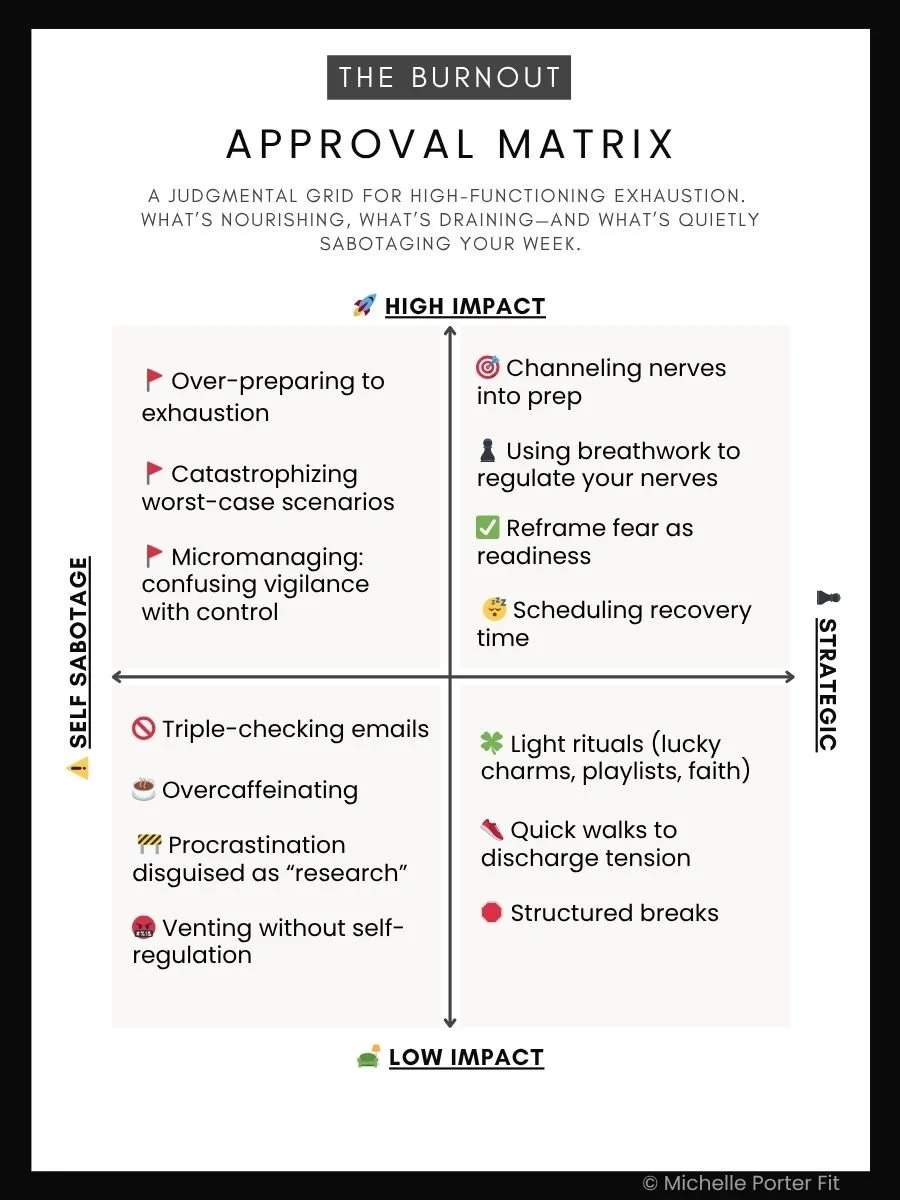🗞️ The Wellness Briefing – Edition No. 17: “Anxiety as a Superpower (Until It Isn’t)” | October 21, 2025
3 minute read
Quick, high-impact wellness insights for ambitious professionals. Delivered Tuesdays.
Welcome Back to The Wellness Briefing
A little anxiety sharpens focus. A lot of anxiety fogs it. This week, we’re breaking down why stress that once fueled your ambition might now be draining your energy—and how to turn anxiety back into a tool instead of a trap.
Because when your drive and your nervous system finally stop fighting each other, your performance gets sharper and more sustainable.
Let’s begin.
🧠 1 Insight Worth Reading: Emerging research shows that moderate stress can enhance working memory, but once stress becomes chronic or intense, cognitive performance declines significantly. Read study on PubMed.
Stress, in the right dose, primes the brain for clarity and precision. But when your baseline is constant urgency, your body can’t tell the difference between a presentation and a threat.
Chronic anxiety rewires focus from strategic to survival mode. Learning to regulate that threshold is what separates sustainable performance from exhaustion disguised as drive.
💡 What That Means for You: That edge you feel before a big pitch? That’s useful stress. The spiral at 2 a.m.? That’s burnout disguised as discipline.
Your nervous system isn’t the enemy—it’s a messenger. When anxiety spikes, it’s your physiology trying to get your attention. The goal isn’t to “calm down,” it’s to channel the signal.
Ask: “What’s this energy trying to prepare me for?” Anxiety becomes fuel when paired with intentional recovery; without it, it becomes friction.
✅ Try This: Before high-stakes work: inhale for 4, hold for 2, exhale for 6. This resets your nervous system into “focused” stress, not “frantic” stress.
It actually works: This form of combat or tactical breathing is used by the military, including the Navy SEALs, to manage stress and improve focus.
Double down and pair your breath work with a grounding cue:
plant both feet
unclench your jaw
visualize exhaling tension from the base of your ribs.
Practiced regularly, this simple pattern builds stress agility—your ability to toggle between activation and recovery on demand.
🎯 Pro Tip from the Guide: Anxiety is data, not destiny. It signals preparation is needed—not that you’re incapable.
The smartest leaders treat anxiety as an early alert system, not a verdict.
Reframe the feeling: instead of “I’m anxious because I’m not ready,” try “I’m anxious because I care about the outcome.” That small linguistic shift moves the emotion from threat to intention—where performance thrives.
📊 Wellness Stat of the Week: Gallup's 2024 State of the Global Workplace report found that employees experiencing "thriving" stress (mild anxiety tied to challenges) were 18% more engaged and 10% more productive than those with low stress.
This was particularly evident in roles requiring preparation, like project management, where anxiety prompted better planning and a 15% increase in on-time delivery (source: Gallup State of the Global Workplace 2024 ).
Translation: worry sharpens focus during planning but sabotages execution. The most resilient performers don’t remove anxiety—they schedule it. They channel that energy into structured preparation, then intentionally release it before showtime.
💬 Coaching Cue: “Anxiety shows up like a micromanager—loud, uninvited, sometimes right. Listen just long enough to get the data, then send it back to its desk.”
When you stop treating anxiety as a flaw and start seeing it as feedback, you build trust with your nervous system. The next time it shows up, treat anxiety like a performance review: valuable input, not absolute truth.
Extract the insight, skip the drama, and get back to work.
📣 Gut Check: Do you feel sharper or slower when anxious?
Sit with this question for a few minutes
Think about which one is your default and why
How can you better channel anxious signals for sharpness?
📈 The Burnout Approval Matrix: A judgmental grid for Anxiety at Work. Anxiety is inevitable—how you metabolize it determines whether it’s jet fuel or quicksand.
Want more support?
Book your free 20-min burnout consult here
Download your full Burnout Recovery Roadmap Guide
Get future issues delivered to your inbox Sign up here.
See you next Tuesday.
– Michelle
